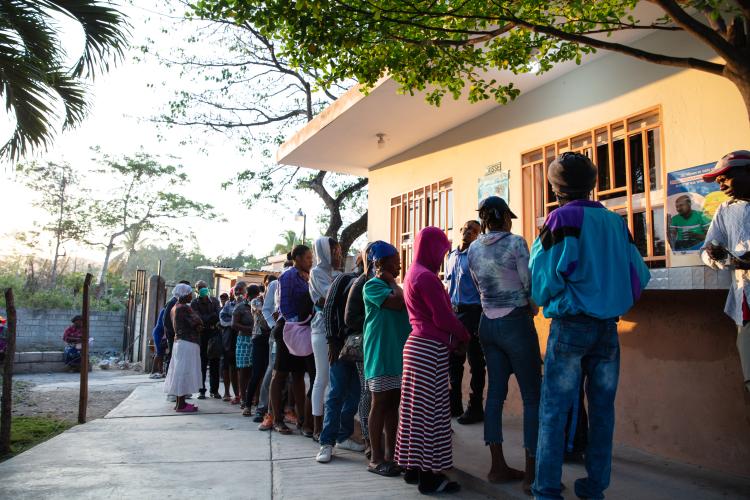“Money never becomes an obstacle for people who need healthcare at St. Boniface Hospital.”
Your donation can help Dr. Saintilien and his staff care for every patient in need, regardless of their ability to pay.


© Nadia Todres
As the humanitarian crisis in Haiti deepens, SBH continues to care for patients 24/7 despite great difficulties. Below, we break down the challenges we’re facing, the impact they are having on SBH, and how we can all help support the people of Haiti during this difficult time.
Ongoing gang violence, largely concentrated in Port-au-Prince, has forced several major health care facilities to close and severely limited operations at many others. Kidnappings and homicides continue to skyrocket, and tens of thousands of Haitians have been forced to flee their homes. Due to the insecurity, the UN reports that fewer Haitians have been using health services in recent years, and especially in the past few months.
Inflation in Haiti is at record highs, and most of the population cannot afford to purchase enough food or other essentials. Multi-year droughts have also impacted crops. As a result, two out of three households are going hungry, putting them at increased risk for disease and other health problems.
The humanitarian crisis also contributed to the cholera outbreak last fall, which quickly spread throughout the country. As of the end of April, Haiti’s Ministry of Health had recorded 680 deaths, and over 37,000 people had been hospitalized with severe diarrhea. While quick and concerted efforts to stop cholera’s spread are working, the disease remains a threat and severe outbreaks are still possible.
Finally, gang activity has been blocking critical ports and roads, and has effectively cut Haiti’s southern peninsula off from the rest of Haiti. The blockages often make it impossible for essential resources to move throughout the country. The result has been periodic stockouts of vaccines, medications, fuel, oxygen, and other resources that hospitals like SBH need to function and provide quality care.
Our staff and patients are dealing with the severe and constant effects of the humanitarian crisis every day.
Many patients are risking travel only when their situation becomes dire – and as a result, we’ve seen increases in patients needing emergency care, including life-saving C-sections and other surgeries. Our hospital-based staff is working around the clock to meet patient demand as well as working together with our supply chain team to prevent stockouts of essential medicines and supplies.
Resource shortages continue to be one of our biggest challenges. We are grateful for the ingenuity of our staff as well as the assistance of our partners in helping us mitigate the impact on our patients and establish new storage and procurement systems that will allow SBH to operate self-sufficiently for longer periods of time.
Our community health team has played a critical role combating food insecurity. The team has distributed food baskets to vulnerable households and provided children and pregnant women with vitamins and nutritional supplements. They also conducted more than 7,000 pediatric malnutrition screenings during the past six months and cared for nearly 200 children with moderate or severe malnutrition.
Our community health team also continues to play a critical role in cholera prevention. In our November update, we reported on the ways we immediately mobilized to help prevent the disease’s spread. The team continues to monitor for the disease and is regularly conducting cholera education and prevention sessions. In March, we rushed rehydration supplies and staff to a referral hospital in L’Asile that saw a sudden influx of cholera patients, enabling an effective response and preventing the further spread of the disease. With cholera hot spots still popping up across the region, HEI/SBH remains on active alert.
UNICEF’s Sara Bordas Eddy recently visited Haiti and stated, “The humanitarian needs in Haiti are unprecedented. We need the donor community to not give up on Haiti.”
Given the severity of the crisis, we reiterate our September 2021 call on the Biden Administration to halt all deportations to Haiti. In addition, the vast majority of the weapons and ammunition fueling violence in Haiti are trafficked from the United States – this must be stopped immediately.
We also call on our supporters to ask their legislators to stand with the people of Haiti against deportations and weapons trafficking, and in support of health and safety. Click here for how to contact your senators and representatives.
HEI/SBH will always do whatever it takes to keep our doors open and care for patients in need. We hope you’ll continue to stand with us and the people of Haiti, unshakable in our shared belief that all people deserve to be safe and healthy.
Your donation can help Dr. Saintilien and his staff care for every patient in need, regardless of their ability to pay.
